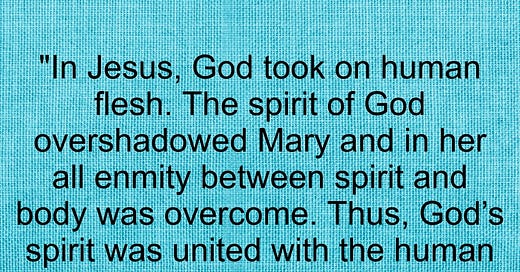The Incarnation and Loving Our Bodies
Thank you to Megan Westra for the summer book study on Henri J.M Nouwen’s, The Inner Voice of Love. For the next few weeks I will be sharing my reflections based on the reading.
Christianity has a complicated relationship with the human body. On the one hand, we affirm a God that became human. Jesus is God embodied. Jesus experienced fatigue, hunger, the need for rest and sleep, and pain. For many Christians, God becoming human is a key part of our theology. On the other hand, there is also a discomfort with humanity. Some Christians get skirmish describing basic human bodily functions. (I'm going to be honest: changing the poop filled diapers of a baby is still rough for me.) Some Christians treat the body or the “flesh” as an obstacle for faithful living and as the site of all sinfulness.
I remember as I was growing up, hearing over and over again how the flesh and the spirit were at constant war with one another and how Satan had no qualms about using our bodies against us. If we got up at 6:00am in the morning to fast and fell asleep while praying, that was the flesh rebelling against our desire to seek God. If we were physically and sexually attracted to other people, we needed to be careful, our flesh was trying to get us to fall into temptation. There was discussion of course, about being made in the image of God but the fall of Adam and Eve meant that image was tarnished.
Yet what if we understood our bodies not as obstacles preventing us from getting closer to God but as the vehicle in which God makes God’s presence known? What if instead of viewing our bodies as objects to be hated and disregarded we began to love our bodies and the bodies of others?
The depiction of the body as a source of evil not only hurts us individually but leads to larger societal issues that furthers injustice. It leads to the notion that while all bodies are imperfect some bodies are more “imperfect” than others and that some bodies “deserve” to be treated better than others. This disdain for the human body has led to structural oppression and violence towards disabled people, who are often infantilized and treated as less than human.
The gospels often recount Jesus healing people and growing up and I was part of a religious tradition that believed that if you prayed hard enough and had enough faith, God would heal you from whatever disability you had. I remember vividly watching as pastors prayed over people in wheelchairs proclaiming that one day they would walk. As a child, that seemed normal, of course we would pray for physical healing, why not? But now this obsession with God providing physical healing seems to reinforce the message that disabled people are a problem to be “fixed.”
This disdain for the human body has also led to continued discrimination towards fat people. Fat people are often ridiculed. And if they happen to be disabled and fat? Well then all of their medical alignments are attributed to their fatness. They are treated as if their fatness is disgusting and a moral failing. They are encouraged to hate themselves and their bodies. They are treated as if they don’t deserve to be loved or treated well. They are mocked if they dare take delight in their own bodies.
Yet such hatred is contrary to the belief in a God who became human. If God found human bodies in all their varieties so disgusting, why would God willingly become one of us? The idea of a God becoming human is a rejection of the notion that the human body is evil. Henri Nouwen proclaims the incarnation demands that we love our bodies. For Nouwen the human body is not an obstacle to experiencing God fully but instead it enables us to fully enjoy God. He states:
“In Jesus, God took on human flesh. The spirit of God overshadowed Mary and in her all enmity between spirit and body was overcome. Thus, God’s spirit was united with the human spirit, and the human body became the temple destined to be lifted up into the intimacy of God through the resurrection.”
What if taking the incarnation seriously means taking our bodies seriously and loving them? What if instead of hating disabled bodies and fat bodies, we recognize how disabled people and fat people are made in the image of God and instead hate the structural inequalities that harm and kill people? What if, instead of propagating a Christianity that frequently splits the holy vs the unholy, the spirit vs the flesh, we embrace a Christianity that encourages to holistically care for every aspect of our being?



